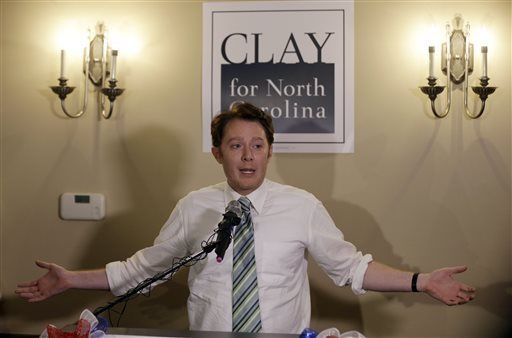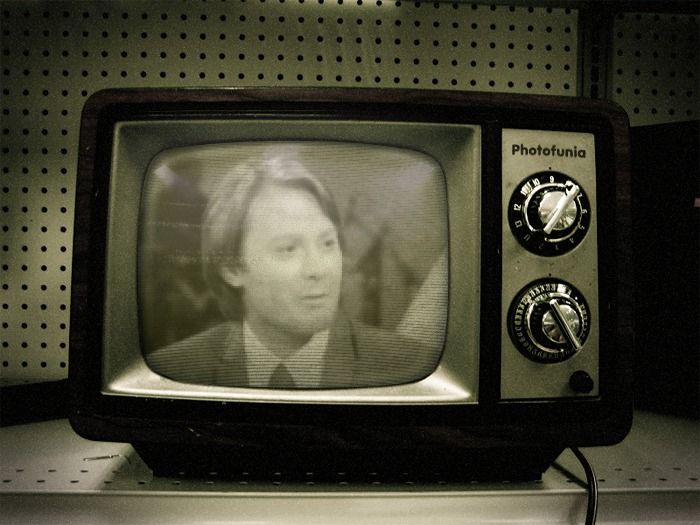The Daily Beast is a website that reports on politics and pop-culture and they are are not afraid to publish their opinions on current news. According to their Editor-in-Chief, John Avlon:
We seek out scoops, scandals and stories about secret worlds; we love confronting bullies, bigots and hypocrites.
Have you ever visited the news site?
On April 3, 2015, The Daily Beast published an excellent article about Clay Aiken. The article was written by Kevin Fallon.
America’s Favorite Loser: Why It’s Time to Take Clay Aiken Seriously
Twelve years and a run for Congress haven’t helped Clay Aiken shed the ghost of ‘Idol.’ But as a new documentary on that political bid proves, there can be glory in second place.
Clay Aiken says “fuck” a lot.
Maybe more than you do. Certainly more than you’d expect him to. He says it within the first 20 seconds of The Runner-Up, a four-part documentary premiering on the Esquire network April 7 about his failed bid for Congress. And he says it many, many times after that.
It’s startling the first few times you hear it, and then becomes endearing. Clay Aiken, it turns out, is not who you expect him to be.
The former second-place finisher of American Idol and your aunt’s favorite pop star is now a straight-talking, politically minded policy wonk more interested in using his microphone to shame change-indifferent career politicians and crusade for education reform and veterans’ rights. And he’s at that glorious stage of a celebrity’s career, the one that not many public personas actually get to.
It’s the brazen stage. It’s, to use a term he’s quite fond of in The Runner-Up, the “fuck it” stage. It’s the stage where an American Idol and Celebrity Apprentice second-place finisher puts his reputation on the line to run for a House of Representatives seat in the 2nd District of North Carolina, agrees to have his efforts filmed for a documentary, and then comes in second again. It’s the stage where America’s Favorite Loser not only owns that branding, but also parlays the distinction into a far more important career than winning any of his various televised contests would have allowed.
Once we all get over the cursing, that is.
“I think they glorify the fact that I cuss more than I anticipated they would,” Aiken tells me, a few weeks before The Runner-Up would premiere.
I tell him that it’s a good thing, because it drives home the point that everything we’ve thought about him may be wrong. That by latching on to the image of the gawky, closeted 24-year-old singing Barry Manilow songs to Paula Abdul, we’ve missed out on a crucial truth: Clay Aiken is no longer ridiculous.
“Well that’s always been our issue,” he says, bringing it back to his congressional run like the excellent politician he’s become. “People put you in boxes. They assume that since all they’ve seen of me is singing then that’s all that I do. That I can’t walk and chew gum other than that.”
“It’s interesting that you saw me as someone who doesn’t cuss,” he continues, “but the bigger problem when we were running was that people saw me as someone who wasn’t able to run, or wasn’t qualified for Congress.” And then, the reason he agreed to participate in The Runner-Up in the first place: “Hopefully—hopefully—the end result of this will be to change people’s minds somehow. But not simply just let them know that I cuss a lot.”
First things first: Yes, Clay Aiken ran for Congress. And, as is his wont, he didn’t win.
In November, Aiken, running as a Democrat, lost the seat he was vying for in North Carolina’s 2nd District to incumbent Republican Renee Ellmers by 18 points. It’s a race that popped in the headlines an inordinate amount of times. Initially, and obviously, because it means our manifest destiny as a celeb-crazed culture was finally complete: An American Idol contestant ran for Congress.
But then the race got dramatic. Like, crazily so.
The Democratic primary was too close to call, a nail-biter even tighter than the notoriously slim margins to which he lost to Ruben Studdard in 2003. Then, as word got out that his opponent Keith Crisco was about to cede the contest, Crisco died. Clay Aiken had killed Keith Crisco.
That is a joke. What is not a joke is that Clay Aiken beat a dead man by 400 votes in his run for Congress. Then in the general election, he’d go on to be runner-up. Again. You can’t make this stuff up.
The soap opera of it all was fortuitous for documentarians Simon Chinn (Oscar winner for Searching for Sugar Man and Man on Wire) and his Emmy-winning cousin, Jonathan. Aiken was courted by a handful of production companies to film his congressional bid, most of them reaching out hours after he announced his candidacy. “Two of them I looked up and they had done something reality show-ish,” Aiken remembers. “I was like, ‘You gotta be fucking kidding me. This is not happening.’”
Aiken had no intention of allowing the Chinns to film him either, recalling how rudely standoffish he acted during their initial meeting to prove his disinterest. But Jonathan was a sweet talker.
He crystalized the usefulness of the documentary regardless of the election’s outcome. That anything they capture about the corruption of the electoral process and Aiken’s pursuit to bring attention to the issues he was running on would be exhibited whether he won or lost. “That got me listening,” Aiken says.
It’s those issues he was running on that got Aiken dragged through the press throughout his campaign. Or rather, the issues he wasn’t talking about.
The kindle for the firestorm was a scathing screed from Bill Maher just before the election that blasted Aiken for, according to Maher, distancing himself from President Obama to appeal to the more conservative voters in his district. He also took him to task for not using the fact that he is a gay candidate in North Carolina to energize the liberal base, instead focusing on “this pipe dream of trying to make the Duck Dynasty types vote for a guy who had his eyebrows done.”
Outlets ran with Maher’s comments, twisting them to say that he was upset that Aiken wasn’t running more on gay issues specifically—something the gay-focused media blew up even more.
In 2008, Aiken joined the long line of celebrities to have unveiled his homosexuality in one of People’s famous “Yes, I’m Gay” magazine covers. Immediately, as is its tendency when a public person comes out as gay, culture-at-large put a mandate on him to become a speaker for gay issues—whether or not he wanted to be—and proceeded to wag its finger at him when he didn’t. When he announced his congressional run, that mandate became even more severe, and the finger-wagging all the more rigorous.
Aiken says it was a frustrating position to be in. It also misrepresented his political intentions, and his intentions as a gay man. Mostly, he says, it wasn’t fair.
“You know what?” he says. “I would have done better for gay rights just automatically than my opponent would have. As a gay man, I’m not going to vote against any LGBT rights.”
This is where it gets complicated, and political. “I needed to win to do that,” he says. “I think sometimes people lose sight of the ring in order to have activism. I ran in a very conservative district—a very conservative district in which I never had people talk to me about gay stuff at all. Not even the people who were upset at me for being gay.”
“I was the celebrity candidate, not the gay candidate,” he says. “I’m gay, but it doesn’t define me any more that it defines anyone else. But for a group of people, they make the mistake of feeling like gay people have to speak about only that in order for there to be an effect.” He gets it, but he disputes it. “You have to have someone stir the turd or no one’s going to smell it. And we have people in that category in all kinds of activism areas. But at the same time you have to have people who normalize the situation. It takes all kinds.”
It’s a nuanced, slightly controversial view on activism, and, as he says, one that this “small group of people” does not share. And making it even more problematic for him is that, with the ever-intense rise of social media and the culture of controversy, those people have a powerful megaphone.
“They think their megaphone is louder than it is,” Aiken says. “And unfortunately they end up being people who end up too often preaching to the choir, instead of preaching to the folks who need to be reached.”
There was a different megaphone, however, that was causing problems for Aiken even after he lost the election. The documentary was announced the day after the election, raising alarms that the whole race was a publicity stunt meant to get Aiken back in the spotlight—a political campaign doubling as a sort-of viral marketing campaign for the film.
It’s an accusation that Aiken denies vehemently. One, because he had no desire to participate in a documentary in the first place—he was the one who was pursued. But also because of the logistics of the whole thing. “I thought they did a horrible job of announcing it,” he says. “It was tacky when they did it, honestly. We just finished the damn campaign.” Still, he concedes that timing was suspicious. “I might have thought the same thing myself,” he says. “It wasn’t.”
If not a publicity stunt, then is The Runner-Up an attempt to finally, after all these years, shed the ghost of American Idol? After all, Aiken has become an outspoken activist for rights for the disabled and those with special needs, as well as a legitimate politician.
“I never necessarily tried to get away from it,” he says. “I understood that I wouldn’t have the platform and the microphone that I have if it weren’t for that show. Who are we kidding?” There is, however, a but. “I will say this year has been the first time that I have been frustrated and wanted to.”
If it weren’t for being American Idol’s Clay Aiken, he says, he would have never been able to run for Congress in the first place. But it so clearly, and even understandably, became a credibility issue when the campaign kicked into high gear.
“It very possibly might have been a noose around my neck,” he says. Being that kid from Idol was a hurdle, and might have been the hurdle he wasn’t able to clear in the election. He tried, staunchly adhering to a no-singing policy during the campaign, and not bringing up American idol.
“But I can’t stop you,” he says. “I got twenty bucks that says you use the words three times in this article. You can’t stop people from doing it, but, shit, that has nothing to do with what I’m doing right now.” (We just counted… we’ve already used the words seven times. Are you on Venmo, Clay?)
Getting people to take him seriously is a journey that Aiken has been making in baby steps. Certainly in the 2nd District of North Carolina, where he debated intelligently and impressively, he’s accomplishing that. “But if you live in Oregon, you saw the headline ‘Clay Aiken Running for Congress,’ you laughed your ass off, and then you went back to work. That’s all you ever heard about it. We certainly haven’t changed the narrative anywhere else.”
Accordingly, a 2016 congressional run is out of the question. 2018 is still in the realm of possibility, but unlikely. He sticks by his opinion that he can affect change as well from outside the House as he can from inside of it, but he maintains he’ll be back in politics eventually. There’s too many issues he cares about to stay out completely.
“I would not say that I would never run again,” he says. Translation: Fuck it.
This is a long article but very interesting and worth reading. At the Daily Beast, you can see a few videos that are a part of the article. You can visit the site at DAILYBEAST .
Have you read this article before?






